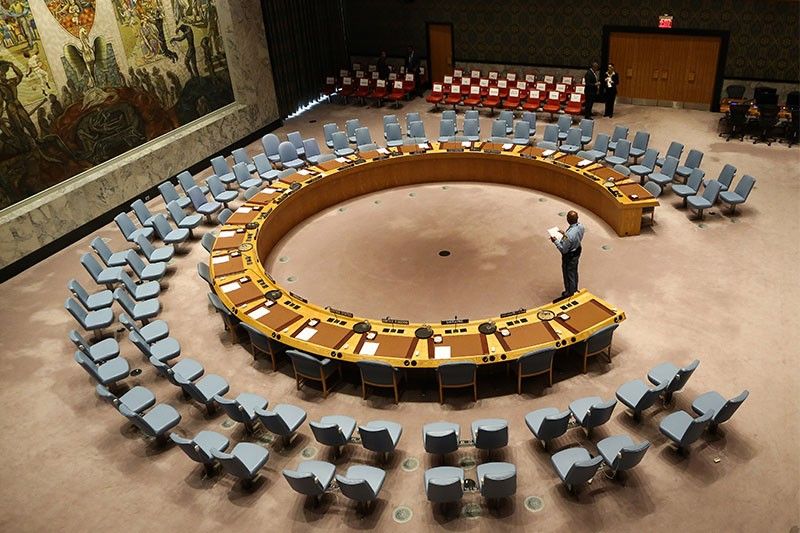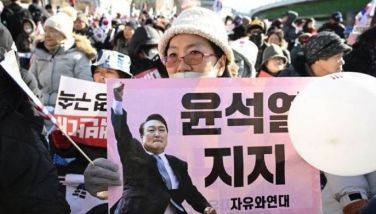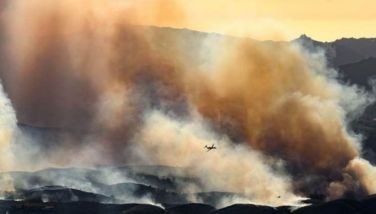UN adopts resolution calling for pandemic-related halt to conflicts

UNITED NATIONS, United States — The UN Security Council on Wednesday unanimously adopted a resolution calling for a halt to conflicts to facilitate the fight against the COVID-19 pandemic, after more than three months of painstaking negotiations, diplomats said.
The resolution, drafted by France and Tunisia, calls for "an immediate cessation of hostilities in all situations" on the Security Council's agenda.
It is the Security Council's first statement on the pandemic and its first real action since the outbreak started.
Tunisia's ambassador to the UN, Kais Kabtani, hailed it as a "historic achievement," but experts questioned whether the text would have any impact and say the paralysis undermined the Council's credibility.
Repeatedly blocked by China and the United States, which opposed a reference in the text to the World Health Organization (WHO), the resolution aims to support an appeal in March by UN Secretary-General Antonio Guterres for a global ceasefire.
It "calls upon all parties to armed conflicts to engage immediately in a durable humanitarian pause for at least 90 consecutive days, in order to enable the safe, unhindered and sustained delivery of humanitarian assistance."
Fighting against jihadist insurgent groups is excluded.
The new text makes no reference to the WHO, which the US has criticized for its management of the crisis. Washington opposed any mention of the WHO back in May.
The Security Council's paralysis for more than three months has been widely criticized, including by some members who have described their "shame" over its inaction.
During the negotiations, the United States and China, the two largest financial contributors to the UN, had both threatened to veto resolutions.
Brokered compromise
According to diplomats, Indonesia, a non-permanent member of the Security Council, helped broker a compromise that saw a reference to a General Assembly commitment to supporting the WHO added to the preamble.
The vague reference was deemed satisfactory to China, which wanted to emphasize the importance of the WHO, and the US, which broke away from the UN body over its handling of the pandemic.
"The adoption of this resolution will send an important signal to conflict parties and may help change calculations on the ground," UN spokesman Stephane Dujarric said in a statement.
On Thursday, Guterres welcomed the fact that his ceasefire request was supported by nearly 180 countries and more than 20 armed groups, but he acknowledged that it had not been followed up with concrete action.
"It seems unlikely that the ceasefire call will actually have much impact in many war zones," said Richard Gowan of the International Crisis Group think tank.
"The Council missed the opportunity to boost the secretary-general's global ceasefire in April or May, when a resolution could have made a significant difference.
"This feels like a belated face-saving device following months of difficult diplomacy," he added.
Oxfam said the delay meant the UN had "failed to protect" millions of people.
Another meeting on the pandemic is scheduled for Thursday.
Follow this page for updates on a mysterious pneumonia outbreak that has struck dozens of people in China.
New Zealand Prime Minister Chris Hipkins says on Sunday that he had contracted COVID-19, testing positive at a key point in his flailing campaign for re-election.
Hipkins saYS on his official social media feed that he would need to isolate for up to five days -- less than two weeks before his country's general election.
The leader of the centre-left Labour Party said he started to experience cold symptoms on Saturday and had cancelled most of his weekend engagements. — AFP
The World Health Organization and US health authorities say Friday they are closely monitoring a new variant of COVID-19, although the potential impact of BA.2.86 is currently unknown.
The WHO classified the new variant as one under surveillance "due to the large number (more than 30) of spike gene mutations it carries", it wrote in a bulletin about the pandemic late Thursday.
So far, the variant has only been detected in Israel, Denmark and the United States. — AFP
The World Health Organization says on Friday that the number of new COVID-19 cases reported worldwide rose by 80% in the last month, days after designating a new "variant of interest".
The WHO declared in May that Covid is no longer a global health emergency, but has warned that the virus will continue to circulate and mutate, causing occasional spikes in infections, hospitalisations and deaths.
In its weekly update, the UN agency said that nations reported nearly 1.5 million new cases from July 10 to August 6, an 80% increase compared to the previous 28 days. — AFP
The head of US intelligence says that there was no evidence that the COVID-19 virus was created in the Chinese government's Wuhan research lab.
In a declassified report, the Office of the Director of National Intelligence (ODNI) says they had no information backing recent claims that three scientists at the lab were some of the very first infected with COVID-19 and may have created the virus themselves.
Drawing on intelligence collected by various member agencies of the US intelligence community (IC), the ODNI report says some scientists at the Wuhan lab had done genetic engineering of coronaviruses similar to COVID-19. — AFP
Boris Johnson deliberately misled MPs over Covid lockdown-breaking parties in Downing Street when he was prime minister, a UK parliament committee ruled on Thursday.
The cross-party Privileges Committee said Johnson, 58, would have been suspended as an MP for 90 days for "repeated contempts (of parliament) and for seeking to undermine the parliamentary process".
But he avoided any formal sanction by his peers in the House of Commons by resigning as an MP last week.
In his resignation statement last Friday, Johnson pre-empted publication of the committee's conclusions, claiming a political stitch-up, even though the body has a majority from his own party.
He was unrepentant again on Thursday, accusing the committee of being "anti-democratic... to bring about what is intended to be the final knife-thrust in a protracted political assassination".
Calling it "beneath contempt", he said it was "for the people of this to decide who sits in parliament, not Harriet Harman", the veteran opposition Labour MP who chaired the seven-person committee. — AFP
- Latest
- Trending
































